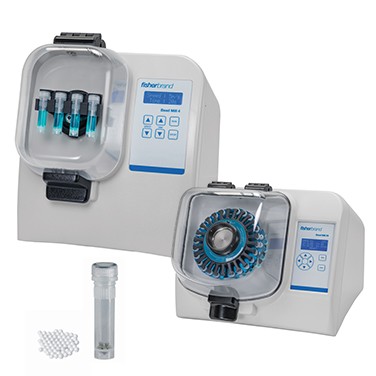Speed, Safety, and Uniformity: The Benefits of Bead Mill Homogenizers
In this fast-paced scientific world, results are critical. But analyzing samples can be slowed by the bottleneck of sample preparation.
Some traditional methods suggest manual grinding with a mortar and pestle or long enzymatic digests for plant, soil, and other difficult samples. But bead mill homogenizers can help you produce quality samples and speed up the sample preparation process.
What Is a Bead Mill Homogenizer?
Bead mill homogenizers can be used to reduce the size of solid particles and universally disperse them in a sample. The beads and sample are added to a tube and then vigorously and rapidly shaken to break up the sample. The homogenization occurs as beads collide with the sample (reducing particle size on a macro scale) and the inner surface of the tube (reducing particle size on a micro scale.) To a lesser extent, shear forces caused by the rapidly moving beads also help with homogenization.
Bead mill homogenization is a very effective method for processing multiple samples at once. Homogenizers use disposable bead and tube combinations, which reduces the risk of cross contamination. Because the process occurs within a closed tube, fewer aerosols are created and user exposure is limited. This can be especially important when samples contain toxic, infectious, or otherwise hazardous substances.
The use of various types and sizes of beads makes this method suitable for many applications. Bead mills effectively extract small molecules like nucleic acids and proteins, dissociate tissue, and recover live cells. The tubes can also be used without adding liquid, making them useful for dry and solid samples.
Bead type and size are important factors when choosing bead tubes to process your samples. Larger beads can break down large or dense structures, while small beads are better for cellular components. Bead shape and density also matter. Denser beads are needed for tougher and harder materials. Irregularly shaped beads can help break down tough or fibrous materials, and their edges can help deliver the force of the moving beads to a smaller surface area.
Fisherbrand Bead Mill Homogenizers
Fisherbrand Bead Mill Homogenizers have a unique carriage motion for efficient bead movement and high impact forces. Increased power reduces processing time and maximizes sample preparation efficiency. Fisherbrand Bead Mill Tubes are available with a range of bead beating materials to help produce a true homogenate, regardless of sample type. Bead mill homogenization can increase your nucleic acid, protein, and small molecule yields to improve the results of your downstream assays.
- Simultaneously homogenize up to 24 x 0.5 mL or 2.0 mL tubes
- Convenient front-loading tube holder for accessibility and ease of use
- Non-stop processing — no cool-down needed between runs
- Smaller footprint
- Run time range: 1 to 99 sec.
- Performance range: 0.8 m/s to 6 m/s (in increments of 1.5 m/s)
- Number of cycles: 1 to 9
Bead mill homogenizers can help you process more samples in less time, have a range that works well for soft tissue samples, and provide rapid sample preparation that can reduce the potential for sample degradation.

